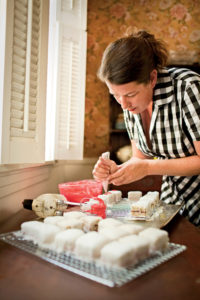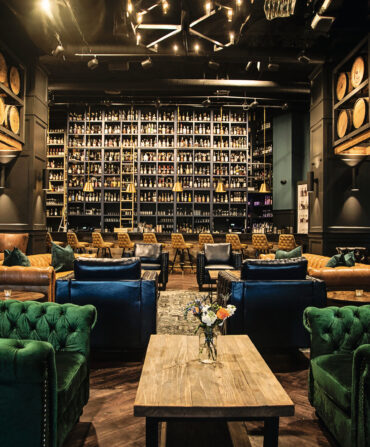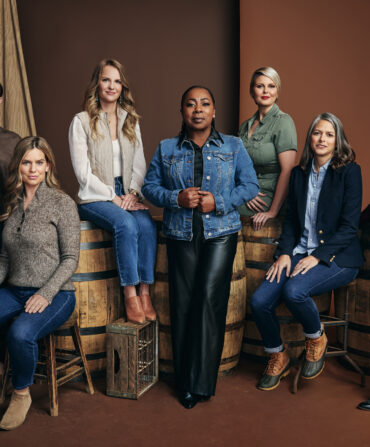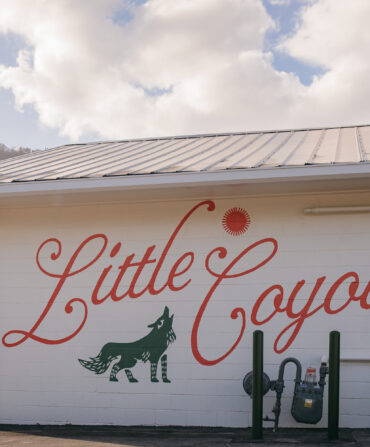Food & Drink
The Other Martha
For cookbook author Martha Hall Foose, there are no lines between food, family, literature, and life
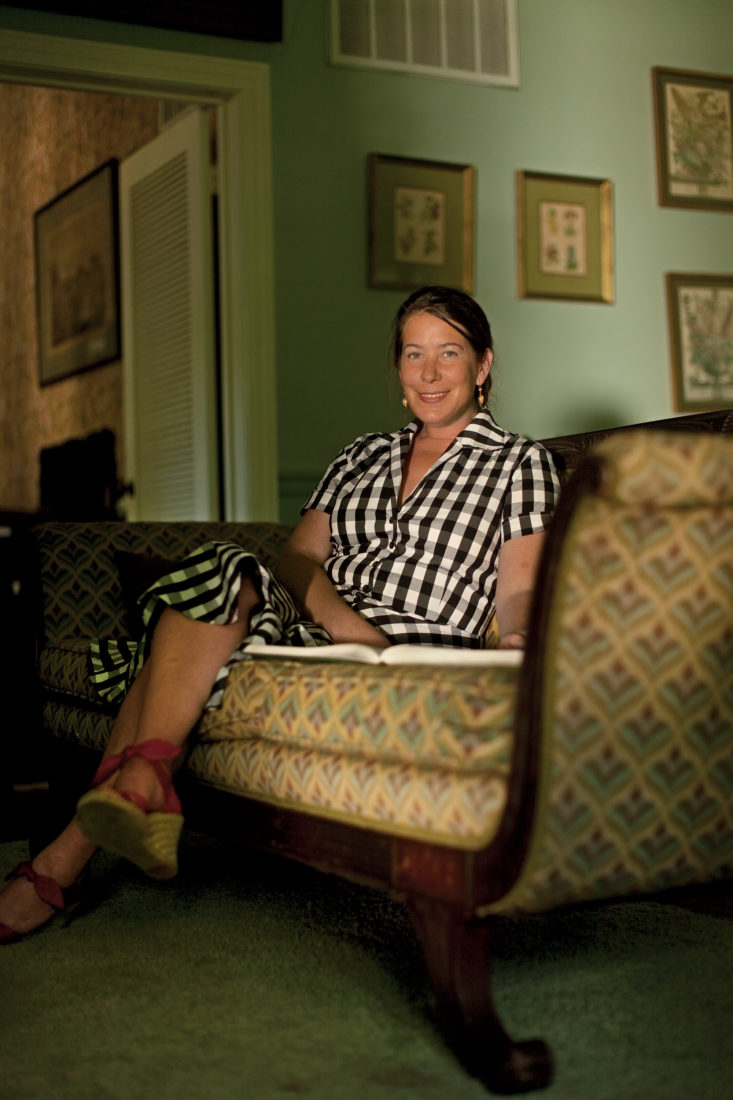
Photo: Chris Granger
It’s unclear how many pies Martha Hall Foose might bake today. The cookbook author is hosting Sunday brunch at Pluto Plantation, her family farm south of Greenwood, Mississippi, and bowls of eggs and sticks of butter cover the kitchen counters. Her eight-year-old son, Joe, has wedged past the half dozen adults to pour himself a wineglass of chocolate milk. The rest of us, a group of friends and family, finish slices of Foose’s latest offering—chocolate chiffon pie—and loiter near the stove. “Nobody seems to actually make it out of the kitchen here,” Foose says.
And who could blame us? After all, the kitchen is where Foose can be found, mixing mimosas and insisting we try doughy, powdered-sugar-dusted Danish treats called ebelskivers—“If you fried heaven in clarified butter, this would be it,” Foose says—or that we reach into the cast-iron skillet and take a piece of smoky venison-and-crawfish sausage: “It’s like Delta surf ’n’ turf.”
Besides being ground zero for pie and sausage and casseroles, this kitchen also inspires much of the warmth and wit that permeate Foose’s two cookbooks: the James Beard Foundation Cookbook Award–winning Screen Doors and Sweet Tea and the newly released A Southerly Course. Foose wrote chunks of them here, in her family’s circa-1914 ancestral home, sitting at the Formica table in the corner and staring out the window. It’s that connection to place that make culinary types swoon. Jonathan Gold, the Pulitzer Prize–winning food critic, has listed her cookbooks among those from the South that he loves best. Her food and tales of everyday Delta life have resonated with home cooks, too.
“When I think of Martha, the first thing I think of is storytelling,” Amy Evans Streeter, the oral historian for the Southern Foodways Alliance, told me two days before I arrived at Pluto. “She’s the best and funniest storyteller I know.”
That’s another reason we won’t leave the kitchen. Foose may be whipping cream, but she’s also sipping red wine from a juice glass and regaling us with stories about her latest gig as a food stylist for The Help, the movie version of the best-selling novel. To recreate a Mississippi table of the 1960s, Foose made camera-friendly aspics, a gingerbread house, 580 pieces of rumaki, Peking duck, and a masterful clove-studded glazed ham. Right now, though, she’s talking about crafting a meat-free, dairy-free “fried chicken” for a vegan starlet.
“I started with a summer squash,” she says. “But it would not hold up after five minutes.” So Foose impaled a vegan hot dog on a Popsicle stick, covered it with Tofurky, and wrapped that with a final layer of vegan pie dough that she lovingly sculpted to resemble chicken skin. Then she stuck the mess in almond milk and fried it. The director, Foose says, was jubilant: “It looks like chicken and it sounds like chicken!”
Did she try the concoction?
“Oh, no,” Foose says, looking pleased. “It wasn’t my responsibility to taste it.”
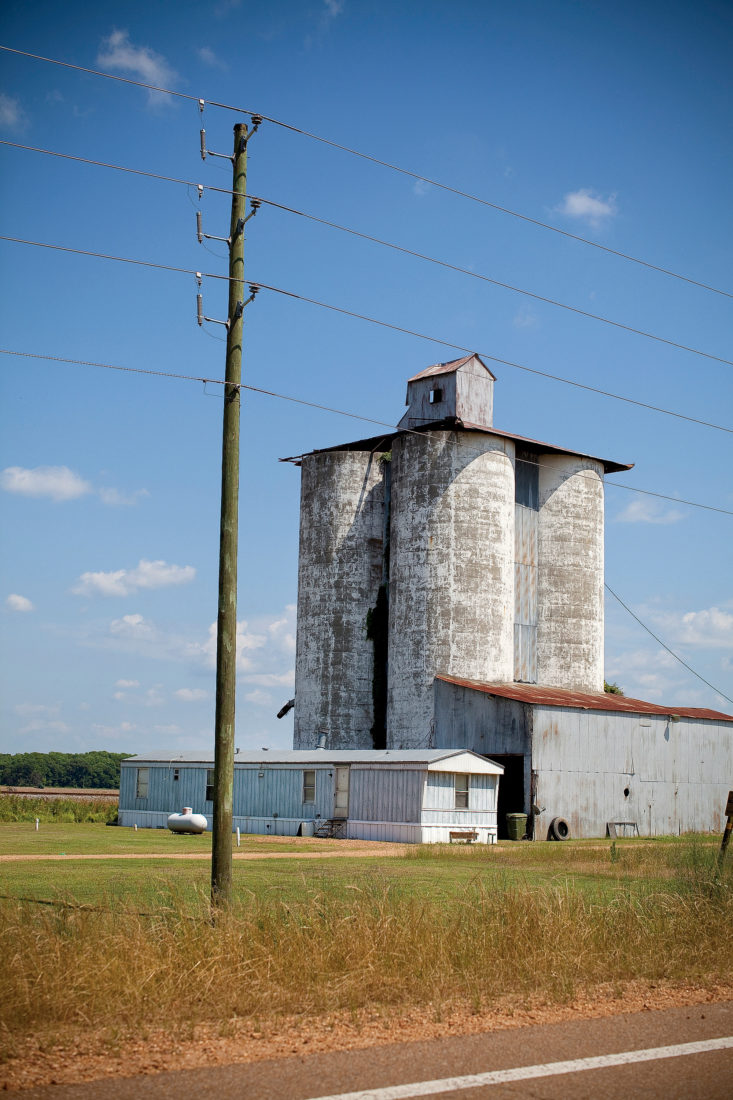
Photo: Chris Granger
Martha's Mississippi
A Delta farm.
From Paris to Pluto
To understand Foose best, you must visit Pluto. The 2,100-acre family farm is the kind of lonely place where approaching guests are identified by the sound of their trucks. The farm, much of which is now a wildlife refuge, is situated near the tiny town of Tchula and the Yazoo River. The property’s name is a mystery, but Foose notes that Pluto is a god of the underworld: “If you can imagine living out here in 1889 before there were any levees—maybe that’s the reason.”
Pluto is a more inviting—bewitching, actually—place now. Before Foose moved into her house here, it belonged to her late grandmother Elsie Foose. Before that, it had been moved twice; it was originally located near the riverfront. Elsie chose the peony-and-pheasant wallpaper in the dining room and rerouted the stairs to descend into the kitchen—a modification inspired by her desire to have nothing to do with child rearing. There’s a great aunt across the street, and seven other relatives who still live at Pluto.
Like many, Foose needed to leave home before she could appreciate it. She traveled: to pastry school in Paris; to Burlington, Vermont; to La Brea Bakery in Los Angeles; and to Oxford in the early ’90s, when the Mississippi college town was more bohemian than posh. Foose opened Bottletree Bakery there and married her bread baker, Donald Bender. (“He wooed me with fried pork chops.”) The couple also moved north, to Minneapolis, where she wrote and edited cookbooks for Pillsbury.
Nine years ago, they returned and revived Elsie’s shuttered house, flinging the doors wide for weddings and gatherings. The couple also invigorated the local food scene. They opened Mockingbird Bakery in Greenwood, and Foose worked as executive chef at the Viking Cooking School. Mockingbird is closed, but Bender’s artisanal bread—he works with wild yeasts instead of commercial varieties—remains a staple in Greenwood restaurants. The couple keep a weekday house there, close to Joe’s school.
But they come to Pluto whenever they can. The house—and Foose—attract creative types. Musicians, scholars, and Russian novelists have traipsed through. Guests, Foose notes, rarely want to leave. The grand details—fourteen-foot ceilings and historic maps of the farm—are softened by an old house’s inevitable quirks. There’s pink tile in the bathroom, faded curtains in the living room, and a mud dauber incursion on the second floor. “This is my favorite place to be,” Foose says. “My family’s here. It’s beautiful.”
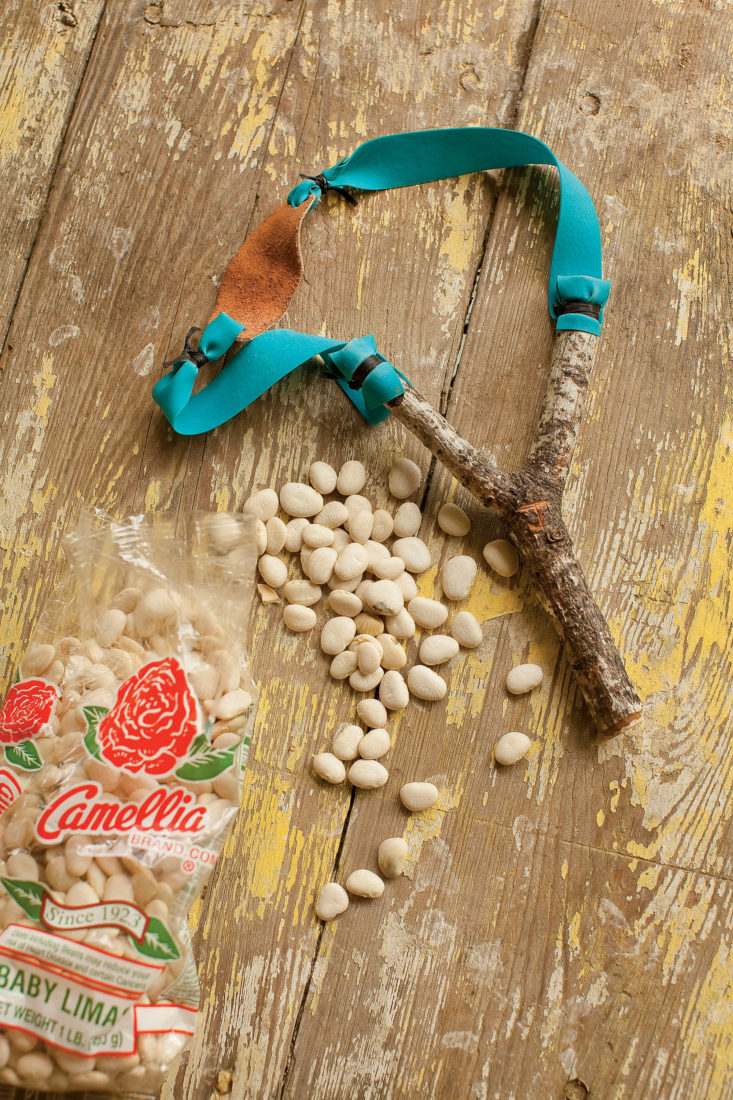
Photo: Chris Granger
Son Joe’s bean shooter.
Taste of the South
On this particular Sunday, the house at Pluto is warmly lit against the gray drizzle outside. A friend, Drew Clarke, has brought homemade raspberry balsamic vinegar; Foose offers duck from the freezer in exchange. Then she pulls a casserole, fragrant of fennel and rich with crabmeat, sweet potato, and dry Jack cheese, out of the oven. Guests also include Karen Carrier, the chef and owner of the Beauty Shop restaurant in Memphis and of Automatic Slim’s in New York. “I think she’s very important to the South,” Carrier says of her friend. “You can taste the South not just in her food but in her words.”
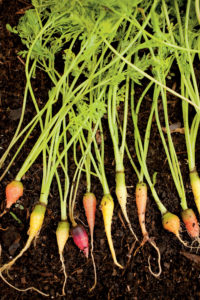
Photo: Chris Granger
Gem carrots.
Indeed, in A Southerly Course, you can almost taste Pluto. This home is in the recipe for crispy wontons, which she makes for Joe in homage to the ones he adores at the local Chinese-American buffet, and in the story about Charlie and Teresa Milner, the couple who process Bender’s deer and who made the venison-and-crawfish sausage. “The first book was much more the iconic Southern foods: the biscuit, the catfish, the fried chicken,” Foose says. “I still thought there was more to tell foodwise about what we cook.” The classics—deviled tomatoes, dirty prawns in rice—appear, but Foose also explores the diversity of Delta eating and the reasons so many of us crave her brand of home cooking.
“Why are my most cherished belongings made of cast iron?” she writes. “I think it is perhaps because we Southerners are homesick for the place in which we still live.” It’s a romantic place, as described in the pages of Foose’s cookbooks, a place of lazy afternoons and close-knit communities. A place where everyone knows the name of the grocer and when it’s time to harvest Egyptian walking onions from the garden. She’s a reflective chronicler, a storyteller influenced by modern Southern chefs like Birmingham’s Frank Stitt and literary giants like Eudora Welty.
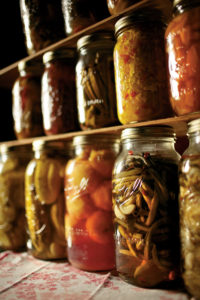
Photo: Chris Granger
Foose’s pickled veggies.
The real-life Foose is more lighthearted than reflective. She declares a kitchen break and herds Drew, Karen, and the rest of us into the snug family room. She puts a jazz CD on—a remarkable recording by Daniel Foose, a cousin. And people drift in post-nap, a perfectly acceptable mid-party activity at Pluto. Foose, of course, starts telling another story: a comedy of errors about her experience amid the culinary celebrities at New York’s James Beard Awards. She wore stilettos (a mistake), persuaded the gatekeepers at the box office that she was indeed a nominee and therefore deserving of a ticket (a triumph), and gave a shell-shocked acceptance speech that began with the words “I’m just tickled pink” (a tad embarrassing).
Karen Carrier, who was there, is laughing hardest of all. “She will come up with some one-liners, let me tell you,” Carrier says. “You could just hear the Daniel Bouluds and the Mario Batalis saying, ‘What did she just say?’”
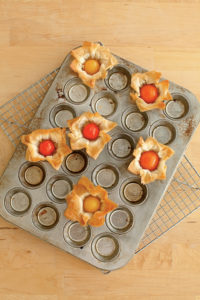
Photo: Chris Granger
Tomatoes in phyllo from the new cookbook.
Foose mentions that it’s hard to be in the same business as that other Martha, the homemaking perfectionist. You probably won’t find Foose, say, handcrafting place cards for the next gathering at Pluto. But she might invite you to “mailbox hour,” where friends and family sip cocktails while milling about the mailbox. Or the much-beloved “BB hour,” where cocktails accompany BB guns so guests can shoot wine corks out of a wee pond.
The brunch revelers wouldn’t have it any other way. “She’s the greatest hostess in the world,” Carrier says. “Martha’s probably one of the funniest people I know. She lights up a room and”—Carrier laughs—“she loves her brown whiskey. You got to remember that.
“Everything she does is just effortless. I don’t know if it’s because she was raised in the Delta or what.”
And so the effortless afternoon wears on. One story follows another, even as the sunlight dims and the brunch hour has long passed. Guests who drove for hours to reach Pluto put on scarves and coats and leave. A young cousin arrives. It might be time, Foose says, to start thinking about dinner.


